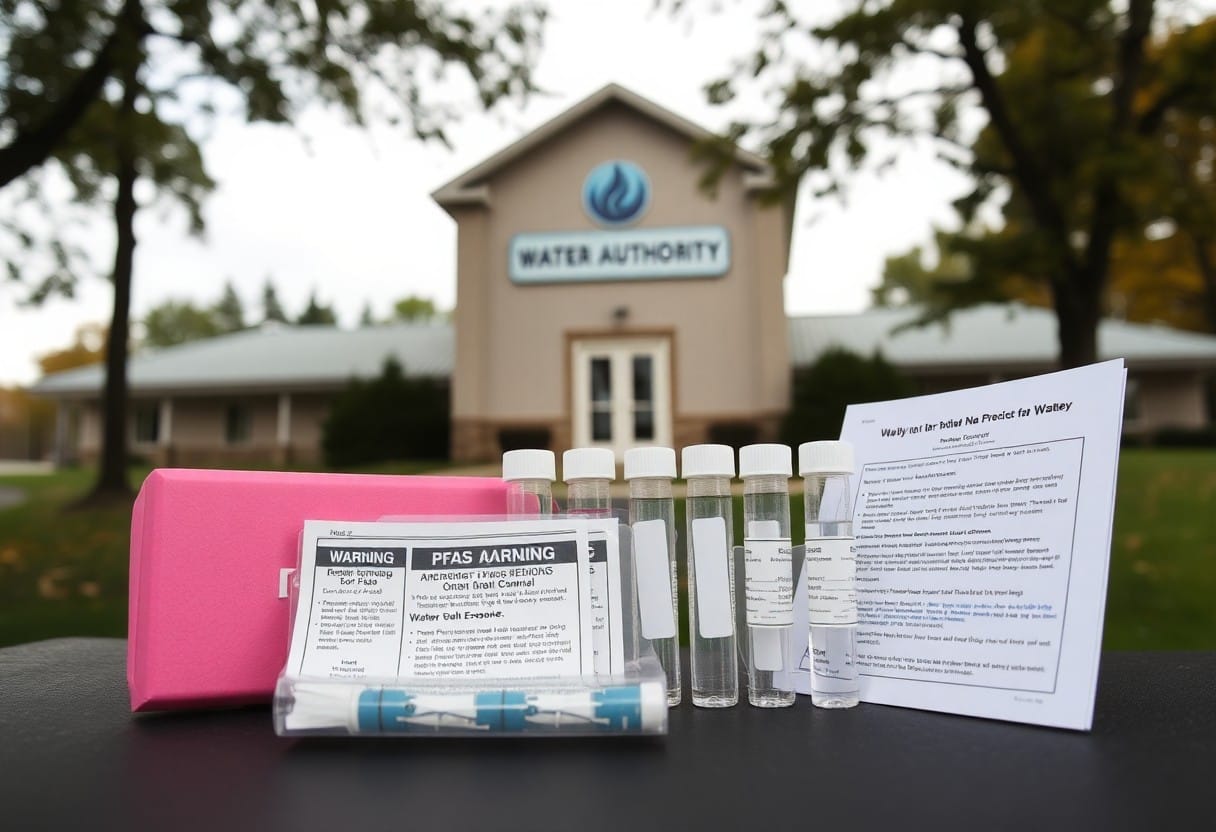There’s a pressing issue affecting your community: the presence of PFAS chemicals linked to Chemours, which can have serious implications for your family’s health. As these forever chemicals seep into local water supplies, they pose significant risks, including increased chances of cancer and immune system disruption. Understanding the impact of these chemicals on your daily life is crucial for making informed decisions regarding your family’s safety. In this post, we’ll probe into how these substances threaten not only your health but also the environment you live in.
Understanding PFAS Chemicals
Definition and Properties
Chemicals known as per- and polyfluoroalkyl substances (PFAS) are a group of man-made compounds that have been widely used in various industrial and consumer applications. These substances are characterized by their unique carbon-fluorine bonds, which provide them with exceptional resistance to heat, water, and oil. As a result, PFAS has gained popularity for its effectiveness in creating nonstick and stain-resistant products. However, their long-lasting nature in the environment, often referred to as “forever chemicals,” raises significant concerns about potential health and environmental impacts on you and your family.
Common Sources and Uses
PFAS compounds can be found in a range of everyday products that may be present in your household. These include nonstick cookware, water-repellent clothing, stain-resistant carpets, and food packaging materials, particularly those that are grease-resistant. You may not realize that these substances can leach into your food and water supply, posing potential risks to your health.
It is important to note that PFAS are utilized extensively in various industries, including firefighting foam, which is notorious for contaminating groundwater and surface water sources. As these chemicals break down at an extremely slow rate, they accumulate in the environment and your body over time. This means that your exposure to PFAS can potentially come from diverse sources, making it critical for you to be aware of where these chemicals are present and seek safer alternatives when possible.
The Impact of PFAS on Human Health
While the presence of PFAS chemicals in the environment has raised alarm bells among health experts, many still underestimate their significance to human health. These substances, widely used in industrial applications and consumer products, are linked to a variety of serious health effects, including hormone disruption, immune system suppression, and even certain types of cancer. As How Chemical Companies Avoid Paying for Pollution highlights, the accountability for these harmful chemicals often lies in the shadows, leaving communities to bear the burden of their repercussions. For Fayetteville families, the stakes are even higher, as ongoing exposure to PFAS can translate into real, long-term health concerns that require immediate attention.
Health Risks Associated with PFAS Exposure
On the surface, you might think that the chemicals in your household products pose minimal risk. However, emerging research shows that PFAS exposure can lead to heightened levels of cholesterol, increased incidence of thyroid disease, and decreased vaccine response in children and adults alike. The cumulative effects of these health risks can manifest in chronic conditions that could disrupt your quality of life, making it imperative to understand the impact these chemicals may have on your health.
Vulnerable Populations in Fayetteville
Across Fayetteville, certain groups are more susceptible to the adverse effects of PFAS exposure. Low-income families and communities of color often face a higher burden due to disproportionate access to clean water and healthcare services. The stressors linked to economic disadvantage can exacerbate the health impacts of these chemicals, putting you and your loved ones at a greater risk for chronic illnesses that PFAS are known to cause.
Another critical factor to consider is that children and pregnant women are especially vulnerable to the health hazards posed by PFAS. For families in Fayetteville, this means ensuring that children are protected from potential harm, as their developing bodies may be more sensitive to the effects of chemical exposure. Additionally, expectant mothers must be aware of how PFAS can affect both their health and the development of their unborn children, signaling an urgent need for targeted interventions and community awareness to safeguard the most at-risk populations.
Environmental Consequences of PFAS
Some families in Fayetteville are beginning to grapple with the alarming environmental consequences of PFAS chemicals. These man-made compounds are notorious for their persistence in the environment, leading to serious concerns regarding their long-term effects on local communities. As these chemicals continue to seep into the soil and waterways, you might wonder about the potential dangers that lie ahead not just for your health, but for the local ecosystem.
Contamination of Local Water Sources
Water is a vital resource for all living beings, and the contamination of local water sources with PFAS is becoming increasingly evident. There is growing scientific evidence that PFAS chemicals have infiltrated drinking water supplies, endangering the health of residents. This contamination could lead to a myriad of health issues for you and your loved ones, including developmental problems and certain cancers. Furthermore, the presence of these chemicals can undermine your access to safe drinking water, making it imperative for you to stay informed and vigilant about the sources from which you derive your water.
Effects on Wildlife and Ecosystems
Alongside health risks to humans, PFAS chemicals pose a significant threat to wildlife and entire ecosystems. These substances have been found in various forms throughout natural habitats, leading to a decline in species health and biodiversity. The bioaccumulation of PFAS in fish and other aquatic organisms can disrupt their reproductive systems and lead to declines in population—all of which can directly affect the well-being of your local environment. As these chemicals work their way up the food chain, you could also unknowingly be consuming contaminated wildlife.
To understand the urgency of addressing the impact of PFAS, consider the fact that these chemicals have been detected in fish, birds, and mammals, all of which form an integral part of the delicate balance of your local ecosystem. The persistence of PFAS means that even low levels of contamination can have far-reaching effects that compound over time. With wildlife suffering from reproductive and developmental challenges, you should be concerned about how these disruptions can lead to not just diminished biodiversity but also a reduction in the natural resources you rely on for recreational and subsistence purposes.
Regulatory Landscape Surrounding PFAS
Once again, you are faced with the reality that regulatory measures regarding PFAS, or per- and polyfluoroalkyl substances, lag behind the serious health risks they pose. Government agencies, including the Environmental Protection Agency (EPA), are grappling with how to best address these persistent chemicals that have infiltrated the environment and may be present in your drinking water and soil. Various states have begun to implement their own regulations, providing a patchwork of rules that can leave you uncertain about the safety of your community. While efforts are underway to establish more consistent guidelines, the complexities and variations in state-level regulations continue to create confusion and concern for families in Fayetteville and beyond.
Current Regulations and Initiatives
Below are some of the existing regulations and initiatives aimed at regulating PFAS. The EPA released an action plan in 2021 that outlines steps to address PFAS, including person-to-person health assessments and creating a regulatory framework for drinking water standards. Furthermore, several states are moving towards stricter limits on PFAS concentrations in drinking water or soils, aiming to reduce the exposure levels for residents like you. However, the pace of these changes can feel frustratingly slow, especially when you consider that studies continue to reveal longer-term health impacts associated with PFAS exposure.
Advocacy and Community Response
One powerful response to the growing concerns about PFAS has come from local advocates who are committed to raising awareness and demanding action from regulators. Grassroots organizations and concerned citizens in Fayetteville have mobilized to educate your community on the implications of PFAS contamination. These advocacy groups often collaborate with scientists, health professionals, and environmental organizations to ensure your voices are heard, pushing for swift legislative changes and public transparency regarding contaminated sites and overall health risks.
Regulatory changes and community action together can create a powerful force for change. As you engage with local advocacy efforts, support initiatives that aim to increase transparency regarding potential sources of PFAS contamination, and demand rigorous monitoring of water quality, you become part of a larger movement aimed at protecting your family’s health and safety. Staying informed and involved is critical to ensure that you, your neighbors, and vulnerable populations are not left to bear the burden of these hazardous pollutants on your own.
Case Studies from Fayetteville
Now, the impact of Chemours’ PFAS chemicals can be best understood through specific case studies in Fayetteville. These examples illuminate the far-reaching effects these toxins can have on families living in the area. Here are some significant statistics and incidents that highlight the issue:
- In a study conducted by the N.C. Department of Health and Human Services, over 25% of tested wells in Fayetteville were found to contain PFAS levels above the EPA-recommended safety limits.
- More than 50 families living near the Chemours facility reported significant health issues, including developmental problems in children and unexplained illnesses.
- A local survey indicated that 70% of residents expressed concerns regarding the water quality and its potential link to PFAS contamination.
- Health assessments conducted by the Agency for Toxic Substances and Disease Registry revealed elevated levels of PFAS in the blood of over 100 individuals residing within a three-mile radius of the facility.
Local Incidents of PFAS Contamination
Any resident of Fayetteville should be aware of the incidents of PFAS contamination that have affected the community. Reports have surfaced detailing the illegal discharge of PFAS chemicals into the air and waterways by the Chemours plant, leading to widespread concern over environmental safety. For example, in 2017, residents began to notice unusual odor and discoloration in local streams, prompting governmental investigations that confirmed the presence of these harmful substances.
Moreover, multiple lawsuits have been filed against Chemours by families directly impacted by the contamination, demanding accountability for the distress and health issues caused by the PFAS exposure. The ongoing litigation has drawn attention to not only the immediate dangers but also to the long-term implications for residents who may feel powerless in the face of corporate negligence.
Community Health Outcomes
Across Fayetteville, the community has begun to see alarming health outcomes linked directly to PFAS contamination. Research indicates a possible correlation between exposure to these chemicals and increased incidences of certain types of cancer, thyroid disease, and reproductive issues. Local healthcare providers have started documenting a rise in unexplained health conditions, which many believe can be connected back to the surrounding environmental hazards.
A growing concern among health professionals is the prevalence of high cholesterol and immune system disorders reported by individuals living near sites of identified PFAS contamination. These conditions have prompted local health departments to launch educational campaigns to inform the public about the risks associated with PFAS exposure and emphasize the need for safe drinking water. You should be vigilant regarding these health risks, as they could directly impact your well-being and that of your loved ones. Engaging in community discussions and advocating for regulatory changes can play a pivotal role in addressing these pressing issues.

Moving Forward: Solutions and Strategies
After identifying the threats posed by PFAS chemicals to Fayetteville families, it’s imperative to explore effective solutions and strategies. A recent article highlights the ongoing challenges surrounding these new ‘forever chemicals’ polluting water near North …. You may feel a sense of urgency to act, knowing that these substances remain in the environment for decades. Understanding how to mitigate these impacts can empower you and your community to advocate for a healthier future.
Mitigation Efforts and Remediation Techniques
One approach to addressing PFAS contamination involves the adoption of advanced water treatment technologies. These methods, such as activated carbon filtration and reverse osmosis, can effectively remove harmful PFAS compounds from drinking water supplies. By proactively advocating for the implementation of these technologies in your local water systems, you can help ensure that your family has safe access to clean water, minimizing exposure to these dangerous chemicals.
Another necessary mitigation strategy is the comprehensive assessment of contaminated sites. Collaboration between local governments, environmental agencies, and community organizations can expedite the identification and cleanup of areas affected by PFAS. You can participate in public meetings and discussions to press for transparency in these efforts, holding accountable those responsible for the pollution while fostering community engagement in the cleanup process.
Policy Recommendations for Greater Protection
At a policy level, it is necessary for local and state lawmakers to enact stricter regulations on PFAS production, usage, and disposal. By advocating for comprehensive policies that address these potent contaminants, you can influence change in legislation that prioritizes public health. Engaging with your representatives and supporting initiatives aimed at strengthening water quality protections can significantly reduce your community’s exposure to PFAS.
Remediation of contaminated water sources and soil is vital to ensure your health and safety. Expanding funding for research on effective treatment methods and establishing strict guidelines for reporting PFAS levels would place a stronger emphasis on protecting communities like yours. By pushing for these policy changes, you contribute to a proactive approach to tackling PFAS contamination, benefiting present and future generations.
To wrap up
Taking this into account, your awareness of Chemours’ PFAS chemicals is imperative for understanding the ongoing risks to Fayetteville families. These substances, present in various consumer products and industrial processes, have infiltrated the local water supply and environment, potentially affecting your health and that of your loved ones. With mounting evidence linking PFAS exposure to serious health issues, including cancer and reproductive challenges, it is vital that you remain informed and proactive about your rights and the measures being taken to safeguard your community.
Furthermore, as residents of Fayetteville, you have the power to advocate for environmental justice and push for transparency from corporate entities like Chemours. Engaging with local initiatives, attending community meetings, and voicing your concerns can amplify the call for stricter regulations and cleanup efforts. By staying informed and involved, you contribute to a collective effort aimed at reducing exposure to PFAS chemicals and promoting a safer, healthier environment for your family and community.



















